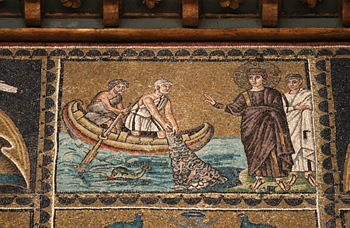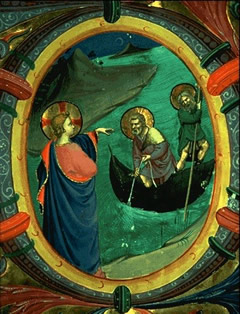A Radical Response to a Unique Opportunity:
"They Immediately Left Everything"
For Sunday January 23, 2011
Lectionary Readings (Revised Common Lectionary, Year A)
Isaiah 9:1–4
Psalm 27:1, 4–9
1 Corinthians 1:10–18
Matthew 4:12–23
During Advent my wife and I joined an adult class at our church that watched a DVD series called A History of Christianity; The First Three Thousand Years. Written by the Oxford historian Diarmaid MacCulloch and produced by the BBC, the six one-hour episodes explore how an obscure Jewish sect became the world's largest religion. We enjoyed the series so much that we watched it a second time with our kids when they came home from college for Christmas.
If you can't read MacCulloch's 1000-page book version of the same title, the DVD series is an excellent alternative. The book and the DVD series made me appreciate in new ways the widely divergent ways in which people from vastly different times and places have confessed Jesus as Lord, from the liturgical "smells and bells" of ancient Syriac Christians (who took the gospel to Baghdad, China, Tibet and India by the eighth century) to the emotional pentecostalism of believers in contemporary Africa, Asia, and Latin America.
 |
Duccio di Buoninsegna, The Calling of Peter and Andrew, 1308-11, Tempera on wood panel. |
Today, according to David B. Barrett, author of the World Christian Encyclopedia, Christianity has experienced an explosion of what he calls “neo-apostolic” movements. Distinct from traditional Protestants, and numbering about 400 million Christians in 20,000 “movements,” neo-apostolic believers “reject historical denominationalism and restrictive or overbearing central authority.” In Barrett's estimate they will constitute 581 million members by the year 2025, 120 million more than all Protestant movements. In two decades these sectarian movements will outnumber Orthodox and Protestant Christians and be almost half the size of worldwide Catholicism.
The gospel for this week returns us to the origins of this global Jesus movement. Matthew writes that "Jesus began to preach, 'Repent, for the kingdom of heaven is near'" (4:17). Those are the exact words that the wild and wooly John the Baptizer preached in the parched desert of Judea and at the shores of the Jordan River (3:1). In Mark's parallel account they're also the very first words spoken by Jesus (1:15).
To repent, says John Howard Yoder, is not to feel bad, but to think differently. To repent doesn't mean to grovel in self-hatred or pious sorrow. When you repent you turn around, change directions, choose a different path, or make a radical rupture. Repentance signals an abrupt end to life on auto-pilot or to business as usual.
Whereas we often construe repentance as a religious word with negative connotations, radical change is exactly what many people long for. The gospel says that "large crowds" flocked to Jesus and his message of repentance. I suspect this happened because in the ministry of Jesus his invitation of repentance was connected to his ministry of healing.
 |
Christ calls Peter and Andrew. Mosaic in Sant'Apollinare Nuovo, Ravenna, c. 500. |
When Jesus saw Peter and Andrew fishing in the Sea of Galilee, he invited them, "Come, follow me." Matthew and Mark dramatize their unequivocal response: "At once they left their nets and followed him." Jesus then saw James and John fishing with their father Zebedee, and likewise called them. "They immediately left the boat and their father and followed him." A year or so later, speaking for the twelve apostles, Peter could even say to Jesus, "We have left everything to follow you!" (Mark 10:28).
"At once," "immediately," and "everything." Why such urgency and abandonment? Why not go home and consider the pros and cons with your family? Won't friends think we're crazy, impulsive, even irresponsible? Won't you regret such a categorical decision? Why not hedge your bet? In the epistle this week Paul admits that from a human perspective the call of Jesus to repentance is both "foolish" and "scandalous" (1 Corinthians 1:18, 23).
Jesus invited Peter, Andrew, James and John to a radical reorientation, because in his own person "the kingdom of God has arrived." Jesus both announced and embodied God's reign on earth, right here and right now. There was an unmistakable element of cosmic fulfillment in his preaching, teaching, and healing: "The kairos has come. The kingdom of God is at hand. Repent and believe the good news!"
The Greek word kairos denotes a critical juncture, a divine intervention, or a special moment, in contrast to mere chronos or everyday clock time. You mark chronos on your calendar, like the soccer game on Tuesday at 4:00 PM. With chronos you might procrastinate with minimal consequences.
Kairos is different. Because kairos denotes a unique opportunity, it invites a radical response, an urgent choice, or a fundamental reorientation. Peter, Andrew, James and John sensed God's kairos, and so they left everything at once to follow Jesus — their father, the hired help, the boat, their nets, their livelihoods, everything that was safe, predictable and familiar.
 |
The Calling of Peter and Andrew by Fra Angelico, c. 1430. |
In stark contrast, Jesus lamented that Jerusalem “did not recognize the kairos of God's coming to you” (Luke 19:44). It's one thing, he warned, to predict the signs of the seasons or the patterns of the weather, but quite another to recognize and act upon the "signs of the kairos" (Matthew 16:3). The smug and secure establishment people often rejected his invitation, didn't believe it, or chose not to hear. A wealthy businessman, for example "went away sad" when Jesus invited him to "Come, follow me" (Mark 10:22). The pagan Ninevites, on the other hand, understood the kairos of God. Much to Jonah's shock and chagrin, those "foreigners" responded to his preaching, repented, and believed his message about Yahweh.
Throughout the Bible, peripheral outsiders who have been marginalized by mainstream insiders connect with Jesus's urgent invitation — the religiously suspect, the ethnic enemy, social outcasts, the economically poor, and the morally impure. Matthew describes the"large crowds" who followed Jesus as people "who were ill with various diseases, those suffering severe pain, the demon-possessed, the epileptics and the paralytics" (Matthew 4:24). In the words of Isaiah's poetry for this week, quoted by Matthew, they were people walking in darkness who were longing for the light.
Jesus's call to repentance is an invitation to healing. It asks God to end all that is old in us and to begin something new. The weak and the weary who know their deep needs and respond to this message have much to teach the strong and the powerful. A favorite prayer of mine from Arsenios (5th century) helps us to begin a new beginning: "My God, do not abandon me. I have done nothing good before Thee, but grant me, in Thy compassion, the power to make a start."
For further reflection:
* Can you recall a time when you truly repented? Or resisted repenting?
* When have you experienced moments of kairos that interrupted chronos?
* Why do the needy respond and the strong often resist the invitation to repentance?
* How can we understand repentance as a positive opportunity instead of a negative obligation?
Image credits: (1) MagicStatistics.com; (2) Sacred-Destination.com; and (3) ArtBible.info.





